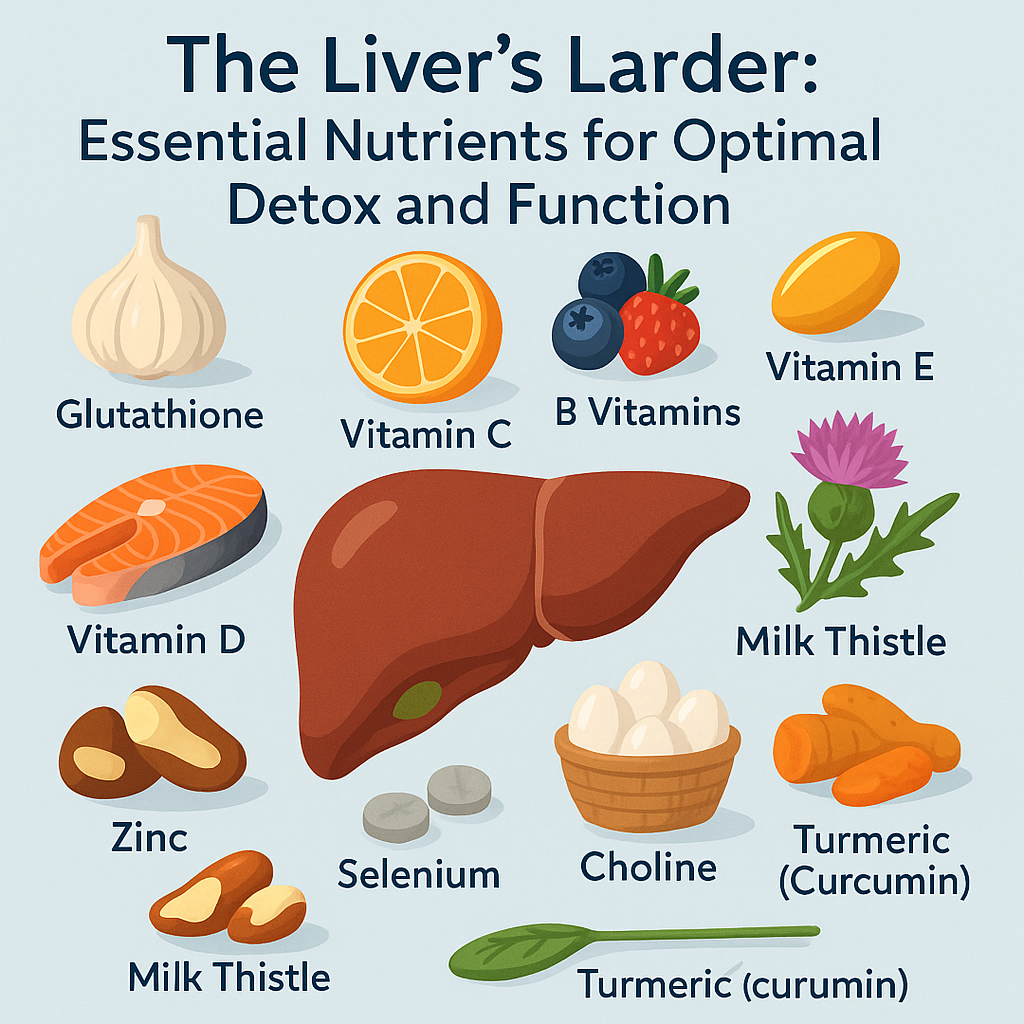News — B vitamins
The Liver's Larder: Essential Nutrients for Optimal Detox and Function
antioxidant support B vitamins choline curcumin detox diet detoxification nutrients fatty liver prevention glutathione healthy liver foods liver detox liver function liver health liver protection liver support supplements milk thistle selenium silymarin turmeric vitamin C vitamin D zinc
The liver works tirelessly behind the scenes, performing over 500 vital functions to keep the body running smoothly. From metabolizing nutrients and regulating hormones to detoxifying harmful substances, this hardworking organ plays a central role in maintaining overall health. Yet, many people overlook how profoundly nutrition impacts liver function.
Like any well-functioning system, the liver requires a steady supply of specific nutrients to perform at its best. These nutrients fuel its complex detoxification processes, support tissue repair, and help prevent damage from oxidative stress. In this article, we'll explore the key nutrients that form the liver’s “larder” — the essential building blocks that nourish and protect one of the body’s most important organs.
Angular Stomatitis & Ariboflavinosis Symptoms
angular stomatitis ariboflavinosis B vitamins B-complex deficiency burning tongue cheilitis cracked lips cracked mouth corners dry lips glossitis health and nutrition mouth sores nutrition and oral health oral care oral symptoms vitamin deficiency riboflavin deficiency tongue inflammation vitamin B2 deficiency vitamin B2 food sources vitamin deficiency mouth
Ariboflavinosis, a condition caused by riboflavin (vitamin B2) deficiency, often manifests in one of the most overlooked yet telling areas of the body: the mouth. From cracked lips and inflamed tongue to the painful condition known as angular stomatitis, these symptoms are not just cosmetic—they're warning signs that your body may be lacking an essential nutrient. Riboflavin plays a crucial role in energy production, cell function, and antioxidant activity, making its deficiency a serious concern.
Among the hallmark signs of ariboflavinosis, angular stomatitis stands out. Characterized by painful cracks or sores at the corners of the mouth, this condition can cause discomfort while eating, speaking, or even smiling. But it’s just one of several oral indicators of riboflavin deficiency. In this article, we’ll explore the key symptoms, what causes them, and how to treat and prevent ariboflavinosis for long-term oral and overall health.
Thiamine and Alcoholism: Understanding the Risks and Prevention
alcohol alcohol use disorder alcoholism alcoholism risks B vitamins Brain Health cognitive health dietary sources energy metabolism health complications mental health neurological health nutrition in recovery prevention thiamine thiamine deficiency thiamine supplements vitamin B1 deficiency Wernicke-Korsakoff syndrome
When it comes to maintaining our health, nutrition plays a foundational role in ensuring that our bodies and minds function optimally. One of the most critical vitamins for both mental and physical well-being is thiamine, also known as vitamin B1. However, individuals who struggle with alcoholism often experience a deficiency in thiamine, which can lead to severe, even life-threatening health issues. Understanding the relationship between thiamine and alcoholism is crucial for anyone working in healthcare, individuals recovering from addiction, or loved ones seeking information to support a family member.
This article delves into why thiamine deficiency is common among those with alcoholism, the health risks associated with this deficiency, and what can be done to counteract the effects. Armed with knowledge, those affected can take proactive steps to protect their health, seek necessary medical intervention, and make dietary changes to mitigate the risks of this dangerous combination.
Power Up Your Life: The Role of Mitochondria in Chronic Fatigue Syndrome
antioxidants ATP production B vitamins cellular energy CFS chronic fatigue syndrome CoQ10 diet for fatigue energy production energy support fatigue management low-intensity exercise magnesium mind-body mitochondria mitochondrial dysfunction mitochondrial health omega-3 fatty acids oxidative stress stress reduction
Chronic Fatigue Syndrome (CFS), known for its unrelenting exhaustion, impacts countless individuals worldwide. While the exact causes of CFS are complex, a growing body of research points to the mitochondria as central to understanding and potentially managing this condition. These tiny but powerful energy factories in our cells play a key role in generating energy, and when they are not functioning optimally, fatigue can set in quickly and deeply. Learning more about the mitochondria’s role in CFS can reveal new ways to support energy levels and improve quality of life for those impacted.
Understanding how mitochondria work, and why they’re often affected in CFS, can open doors to new treatment strategies. From lifestyle choices to nutrition and supplementation, many methods can support mitochondrial health. With the right tools, it’s possible to give your mitochondria a boost and, in turn, take a step toward improving energy levels and reducing the symptoms of chronic fatigue.




